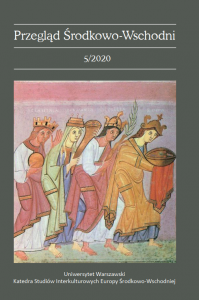Lieux de Mémoire na pograniczu polsko-ruskim:
przypadek ziemi chełmskiej (po 1863 roku)
Lieux de Mémoire on the Polish-Ruthenian Frontier: the Case of Chełm Region (after 1863)
Author(s): Matteo PiccinSubject(s): History, 19th Century
Published by: Uniwersytet Warszawski - Katedra Studiów Interkulturowych Europy Środkowo-Wschodniej
Keywords: nostalgia; memory; nationalism; Russian Empire; Kingdom of Poland
Summary/Abstract: This article analyses the nationalization process among the Ruthenian population of Chełm Region in the period after the January Uprising. From the 1850s, Russian intellectuals of the Slavophile and Pan-Slavic orientation began to perceive the eastern frontier of the Kingdom of Poland as indigenously Russian land. These areas, as a result of the Brest union, were for a few centuries strongly influenced by Polish culture and the Roman Catholic Church. The Russian authorities sought to build Russian national and Orthodox religious consciousness among the local Ruthenian people using tools (lieux de mémoire) such as museums, newspapers and apologetics, both scientific and popular, directed towards both schools and the common people. Further tools included the celebration of state and church anniversaries, the erection of monuments, and the renovation of churches in the Byzantine style. Most of these lieux de mémoire were created, invented, or reworked to serve the nation-state. This “Nostalgic experience” was a way of shaping and directing historical consciousness. Russian national State was thus conceived, establishing and legitimating itself as a great regenerative process founded on, and made of, memory. The ideology of government-supporting intellectuals and clergy in the borderlands of the empire can be defined as primordialism, according to which the nation is defined as a group based on a perpetual community of origin, religion and morality, as well as attachment to the land of fathers. The practice of such periphery nationalism differed significantly from the famous doctrine of official nationality, formulated by Sergey Uvarov in the 1830s. Nationalist concerns from the borderlands were one of the factors that led to the evolution of the St. Petersburg elite’s policy towards nationalization of the Romanov Empire.
Journal: Przegląd Środkowo-Wschodni
- Issue Year: 5/2020
- Issue No: 5
- Page Range: 9-43
- Page Count: 35
- Language: Polish

